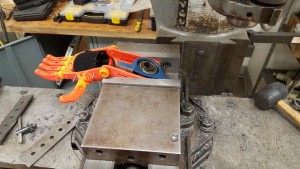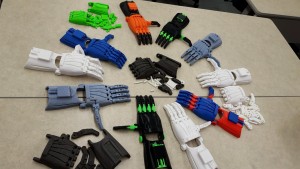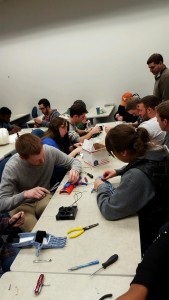Students creating helping hands
SUNY Polytechnic Institute engineering students are lending their incredible skills to help a local robotics team do good across the globe.
The RoboSpartans team of New Hartford, made up of high school students from New Hartford, Utica, and home-schooled students, as one of many large outreach projects, have teamed with the volunteer group called e-NABLE, made up of more than 7,000 engineers and “makers” from around the world that use 3D Printers to create prosthetic hands for those in need. The local team is spearheading an ongoing collaborative effort that recently finished its first round of creating more than a dozen prosthetic hands for third-world countries.
The RoboSpartans are an independent, community-based, FIRST (For Inspiration and Recognition of Science and Technology) Tech Challenge team run out of the basement of Robert Payne – their coach as well as an adjunct professor of mechanical engineering at SUNY Poly. Payne’s team meets year-round, up to three times a week and was the first competitive FTC Team in Central New York back in 2010.
Their goal is to be a role model for current and future robotics teams, spreading the word about FIRST and helping to promote STEM (Science, Technology, Engineering and Math education) in the community and beyond.
The team gathered more than a dozen of their fellow FIRST Tech Challenge teams from nine states and two countries to use their access to 3D Printers to create the parts for the prosthetic hands. After they are created, the elements for the prosthetic hands are shipped to the RoboSpartans and turned over to mechanical engineering students at SUNY Poly for inspection, testing, and assembly.

A prosthetic hand in production through the combined efforts of the New Hartford RoboSpartans and engineering students at SUNY Poly.
The completed units are then shipped by the RoboSpartans to hospital field teams heading out to impoverished areas of the world. Currently, the team has more than a dozen hands that are ready to ship to the next field unit as designated by e-NABLE.
It was while participating in the National Maker Faire in June 2015 in Washington, D.C. that e-NABLE representatives first met the RoboSpartans. The Faire brings together inventors, tinkerers, and makers of all ages to give curious, inventive people a place to share what they love to make.
Since then, the RoboSpartans team completed an approval process in order to become listed as a “helping hands” supplier and be part of a matching project where individuals in need, whether they be around the world or close to home, can be paired with the team in order to create the customized prosthetic hands.
“Pairing fellow teams with e-NABLE seemed a perfect fit,” Payne said. “e-NABLE established a relationship with one of our team sponsors, 3D Systems, Inc., a 3D Printer manufacturer. 3D Systems partnered with FIRST, Will.I.Am and Coca Cola to giveaway over 1,600 EKOCYCLE 3D Printers to FIRST teams last year. We knew teams around the world had printers and a desire to give back. It was just a matter of creating a way for them to get involved easily during their competition season.”

Prosthetic hands created by New Hartford RoboSpartans and SUNY Poly engineering students help those in need.
As an adjunct instructor at SUNY Poly, Payne enlists students in his Production and Operations Management class to take on testing, inspecting and assembly of the prosthetic parts.
“By having engineering students involved, we reduced team input to something manageable between competitions help college students get real-world experience with a truly important project,” Payne said. “We’ve also made connections with teams willing to replicate what we’ve done and added a new college contact in Budapest, Hungary.”
This large-scale project by the team has been documented, in order to provide a template for future projects to other teams and colleges. The effort was so successful that Payne’s spring semester class at SUNY Poly is repeating the process with additional FIRST Tech Challenge teams.
“We are in the process of expanding our 3D printing capabilities, as well as establishing a center for assistive technology to help a wide variety of people with physical disabilities,” said Dr. Daniel Jones, Chair of the Engineering Technology Department at SUNY Poly. “The work being done by Mr. Payne with his students is a great way to kick-start these initiatives. Students really get motivated when they develop technology to help others.”
Recent Comments
Archives
- September 2018
- August 2018
- May 2018
- April 2018
- March 2018
- February 2018
- January 2018
- December 2017
- November 2017
- October 2017
- September 2017
- May 2017
- April 2017
- March 2017
- February 2017
- January 2017
- December 2016
- November 2016
- October 2016
- September 2016
- August 2016
- May 2016
- April 2016
- March 2016
- February 2016
- January 2016
- December 2015
- November 2015
- October 2015
- September 2015
- August 2015
- May 2015
- April 2015
- March 2015
- February 2015
- January 2015
- December 2014
- November 2014
- October 2014
- September 2014
- August 2014
- May 2014
- April 2014
- March 2014
- February 2014
- January 2014
- December 2013
- November 2013
- October 2013
- September 2013
- August 2013
- June 2013
- May 2013
- April 2013
- March 2013
- February 2013
- January 2013
- December 2012
- November 2012

